
LHB-Hydroscience Journal
Scope & Guideline
Elevating Hydroscience Research for Global Impact
Introduction
Aims and Scopes
- Flood Forecasting and Management:
A core area of the journal is the development and improvement of flood forecasting methodologies, including the use of hydrodynamic models, data assimilation techniques, and probabilistic forecasting approaches. - Water Resource Management:
Research on the management of water resources, particularly in the context of climate change, urbanization, and extreme weather events, is a significant focus. This includes studies on irrigation efficiency, water allocation, and risk management strategies. - Hydrological Modeling and Data Analysis:
The journal promotes studies that enhance hydrological modeling techniques and data analysis, which are crucial for understanding water systems and predicting hydrological responses to various environmental factors. - Nature-based Solutions and Ecosystem Services:
There is an increasing emphasis on nature-based solutions for managing water-related risks, highlighting the importance of integrating ecosystem services into hydrological planning and policies. - Climate Change Impact Studies:
The journal addresses the impacts of climate change on hydrological processes and water management, offering insights into adaptation strategies and resilience planning.
Trending and Emerging
- Integration of Technology in Water Management:
The use of advanced technologies, such as remote sensing, machine learning, and real-time data analytics, is increasingly prominent in the journal's publications, reflecting a trend toward more precise and efficient water management solutions. - Focus on Climate Resilience and Adaptation:
There is a growing emphasis on developing resilience strategies to cope with the impacts of climate change on water resources. This includes research on adaptation practices and sustainable management of water systems. - Community and Stakeholder Engagement:
Emerging studies highlight the importance of involving local communities and stakeholders in water management decisions, reflecting a shift towards participatory approaches that enhance governance and accountability. - Urban Water Management Innovations:
Research on innovative practices for managing urban water resources, particularly in smart cities, is on the rise. This includes optimizing infrastructure for irrigation and stormwater management to enhance urban resilience. - Nature-Based Solutions for Flood Risk Reduction:
The journal is increasingly publishing studies on nature-based solutions as effective strategies for managing flood risks, emphasizing the integration of ecological approaches into traditional engineering practices.
Declining or Waning
- Historical Flood Events Analysis:
Research focused on historical flood events, while still relevant, has seen a decline in the number of publications. This shift may be due to a growing preference for predictive modeling and proactive flood management strategies. - Traditional Hydrometric Techniques:
There is a noticeable decrease in studies centered on traditional hydrometric methods, possibly due to advancements in technology and the adoption of more innovative approaches such as remote sensing and real-time monitoring systems. - Generalized Water Quality Studies:
Broad studies on water quality that do not focus on specific pollutants or contexts are becoming less frequent, as the journal increasingly favors targeted research that addresses specific environmental challenges. - Static Water Management Practices:
Research that advocates for static or traditional water management practices is declining. The journal is leaning more towards adaptive and dynamic management approaches that respond to changing environmental conditions.
Similar Journals

Meteorology Hydrology and Water Management-Research and Operational Applications
Innovating solutions for sustainable water management.Meteorology Hydrology and Water Management - Research and Operational Applications is a prominent academic journal published by the Institute of Meteorology and Water Management, based in Warsaw, Poland. With a focus on advancing the understanding and application of meteorology, hydrology, and water resource management, this journal plays a crucial role in disseminating high-quality research that contributes to both theoretical knowledge and practical applications in these pivotal fields. Although it operates under traditional access options, the journal is dedicated to providing valuable insights and solutions to challenges faced by researchers, practitioners, and policymakers in water management and environmental studies. Researchers keen on exploring innovative methodologies, operational tools, and empirical studies will find this journal an essential resource in enhancing their work and understanding of the dynamic interplay between meteorological phenomena and water resource management. The journal's commitment to maintaining rigorous scholarly standards ensures that every publication drives impactful dialogues within the community and beyond.
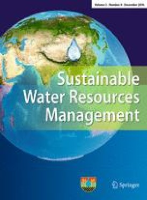
Sustainable Water Resources Management
Fostering innovation in water resource management.Sustainable Water Resources Management is an esteemed journal focusing on the critical field of water resource management in the context of sustainability. Published by Springer International Publishing AG, this journal serves as a vital platform for researchers, policymakers, and practitioners to disseminate cutting-edge research and innovative practices aimed at addressing global water challenges. With an impressive impact factor aligned with its Q2 ranking in Water Science and Technology and Q3 in Renewable Energy, Sustainability, and the Environment, it maintains a robust reputation in its field, evidenced by its Scopus rankings. Covering a diverse range of topics from integrated water resource management to the nexus between water and energy, Sustainable Water Resources Management is committed to fostering knowledge exchange and encouraging interdisciplinary dialogue among its audience. This journal, operating under strict academic rigor, plays an essential role in advancing sustainable practices and is open from 2015 to 2024, making it a relevant resource in today’s rapidly evolving environmental context.

Journal of Flood Risk Management
Exploring solutions to mitigate global flood challenges.The Journal of Flood Risk Management, published by WILEY, is a premier academic journal dedicated to advancing the understanding and management of flood risks, emphasizing interdisciplinary approaches in environmental engineering, geography, safety, and water science. Since its inception in 2009 and transitioning to an Open Access model in 2020, this journal has quickly established itself within the top quartile (Q1) across multiple categories, including Environmental Engineering and Geography, Planning and Development, reflecting its high impact and relevance in the field. With an impressive ranking among the top journals—62nd in Geography, 28th in Water Science and Technology, and 25th in Safety, Risk, Reliability and Quality—this journal serves as an essential platform for researchers, professionals, and students alike, providing them with valuable insights and innovations related to flood risk management. Situated in Denmark, the journal aims to foster collaboration and knowledge exchange, addressing critical challenges faced by societies globally in mitigating and adapting to flood risks.
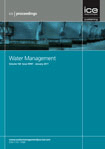
PROCEEDINGS OF THE INSTITUTION OF CIVIL ENGINEERS-WATER MANAGEMENT
Driving Change in Water Management through Scholarly ExcellencePROCEEDINGS OF THE INSTITUTION OF CIVIL ENGINEERS-WATER MANAGEMENT is a prestigious journal published by Emerald Group Publishing Ltd, dedicated to advancing the field of water management within civil engineering. With an ISSN of 1741-7589 and an E-ISSN of 1751-7729, this journal delivers peer-reviewed research that spans the critical intersections of water science and technology, contributing valuable insights into sustainable water management practices. As evidenced by its ranking in the 2023 Scopus categories, where it holds the Q3 quartile in Water Science and Technology, and a respectable position among its peers, the journal remains a vital resource for researchers, professionals, and students in the field. Though it is not an open-access journal, it offers accessible subscription options that facilitate worldwide dissemination of knowledge, enhancing its role as a fundamental reference point for cutting-edge developments in water management. For those looking to publish or stay updated on the latest research trends, this journal serves as an essential platform for promoting innovation and sustainable practices in civil engineering and water resources management.

Journal of Water Management Modeling
Pioneering Solutions for Today's Water ChallengesThe Journal of Water Management Modeling, published by COMPUTATIONAL HYDRAULICS INT, stands as a pivotal resource in the fields of Civil and Structural Engineering, Geography, Planning and Development, and Water Science and Technology. With an ISSN of 2292-6062, this Canadian-based journal has earned its reputation by exploring innovative modeling approaches to enhance water management, crucial in addressing today's environmental challenges. Despite its current Q3 status in Civil and Structural Engineering and Water Science categories, alongside a respectable Q2 rank in Geography, the journal is committed to advancing knowledge and fostering collaboration among researchers, practitioners, and students passionate about the sustainable management of water resources. The journal operates on an open-access model, ensuring research is readily available to a broad audience, and has converged its editorial focus from 2018 to 2024, continuously adapting to emerging trends and technologies within the discipline. As a part of the global conversation regarding effective water management, it plays a vital role in informing policies and practices that impact communities and ecosystems alike.

JOURNAL OF HYDROMETEOROLOGY
Charting New Territories in HydrometeorologyJOURNAL OF HYDROMETEOROLOGY, published by the American Meteorological Society, is a leading scholarly journal that serves as a vital resource within the field of atmospheric science. With its ISSN 1525-755X and E-ISSN 1525-7541, this journal provides a platform for the dissemination of high-impact research, currently holding a prestigious Q1 ranking in Atmospheric Science as per the 2023 Category Quartiles. It enjoys an excellent reputation, ranked #30 out of 148 in the Scopus listings, placing it in the top 80th percentile within Earth and Planetary Sciences. Publishing rigorous and innovative studies from 2000 to 2024 and beyond, the journal addresses critical topics including weather forecasting, climate dynamics, and hydrological processes, making it essential reading for researchers, professionals, and students alike. Though not an open-access journal, it continues to enrich the academic community with quality contributions dedicated to advancing our understanding of hydrometeorological phenomena.
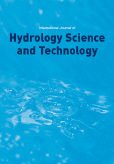
International Journal of Hydrology Science and Technology
Pioneering Research at the Intersection of Hydrology and TechnologyThe International Journal of Hydrology Science and Technology, published by InderScience Enterprises Ltd, is a distinguished platform dedicated to advancing knowledge in the field of hydrology, environmental engineering, and water science. With an ISSN of 2042-7808 and an E-ISSN of 2042-7816, this journal, established in 2011 and continuing through 2024, serves as an essential resource for researchers, professionals, and students alike. Despite being categorized in the Q3 quartile across multiple disciplines including Earth and Planetary Sciences, Environmental Engineering, Waste Management and Disposal, and Water Science and Technology, the journal maintains a reputation for contributing significant findings that impact both theory and practical applications in addressing hydrological challenges. Currently unavailable through Open Access options, the journal remains committed to disseminating valuable research that informs sustainable practices in water resource management. The editorial team encourages submissions that explore innovative strategies and methodologies while fostering interdisciplinary discussions, making this journal a pivotal player in shaping the future of hydrological science.
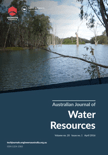
Australasian Journal of Water Resources
Championing Environmental Stewardship Through Water ResearchThe Australasian Journal of Water Resources, published by Taylor & Francis AS, stands as a pivotal resource in the field of water science and technology. With an ISSN of 1324-1583 and E-ISSN 2204-227X, this esteemed journal facilitates the dissemination of high-quality research articles that address critical issues facing water resources management across Australasia and beyond. Ranking in the Q2 category for Water Science and Technology as per the 2023 metrics, it boasts an impressive Scopus ranking of 75/261 in Environmental Science, placing it in the 71st percentile for its field. Spanning from 2008 to 2024, the journal emphasizes the importance of sustainable water practices, innovative technologies, and environmental policy, making it an invaluable asset for researchers, professionals, and students seeking to advance their knowledge and contribute to the discourse on water management challenges. The journal's rigorous peer-review process and commitment to open academic dialogue ensure that emerging trends and pioneering ideas receive the attention they deserve.

Earth Systems and Environment
Bridging Disciplines to Understand Our Changing WorldEarth Systems and Environment, published by Springer International Publishing AG, is a leading peer-reviewed journal dedicated to the multidisciplinary study of natural and anthropogenic processes that shape the Earth's systems. With an impressive impact factor and consistently ranked in the Q1 category across various fields, including Computers in Earth Sciences, Economic Geology, and Environmental Science, it stands as a premier platform for researchers and professionals seeking to address pressing environmental challenges. The journal covers a wide spectrum of topics, from geology to global change, and emphasizes innovative methodologies and interdisciplinary approaches to understand and manage Earth systems. As an essential resource for scholars and practitioners, Earth Systems and Environment commits to excellence and facilitates open dialogue on critical issues affecting our planet.
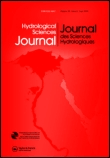
Hydrological Sciences Journal
Bridging research and practice in hydrological sciences.Hydrological Sciences Journal, published by Taylor & Francis Ltd, is a leading peer-reviewed publication dedicated to advancing the field of hydrology, spanning topics from water management to climate impacts on hydrological systems. With an impressive impact factor and a noted Q1 category ranking in Water Science and Technology, the journal occupies a pivotal role in the academic landscape, facilitating high-quality research dissemination since its inception in 1982. The journal is indexed in Scopus, holding a commendable rank of #48 out of 261 in the Environmental Science category, placing it in the 81st percentile among its peers. Although it does not offer Open Access options, the journal ensures extensive reach and readership through institutional subscriptions. As it converges toward its milestone of 2024, the Hydrological Sciences Journal remains an indispensable resource for researchers, professionals, and students eager to explore the latest advancements and methodologies in hydrological research.